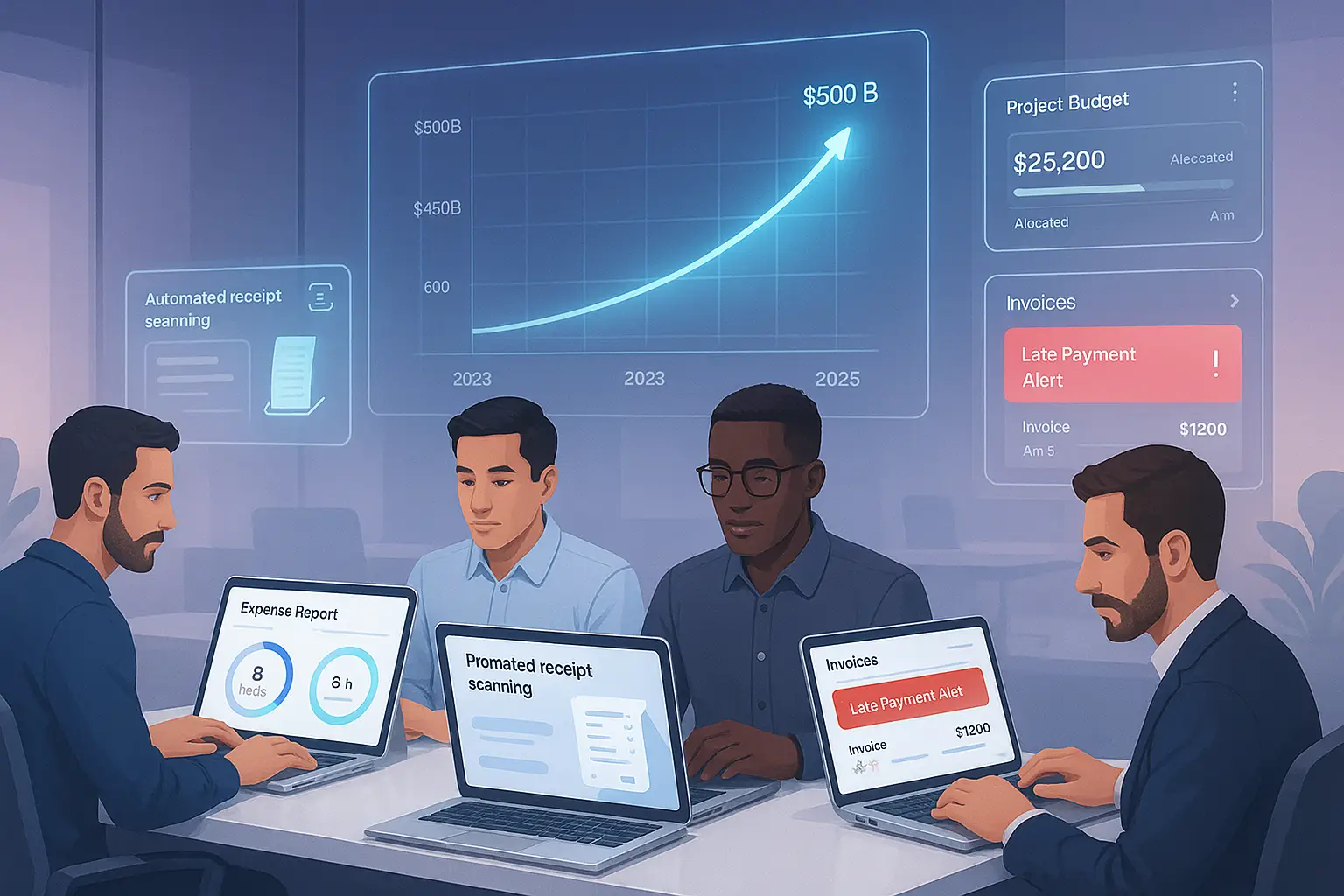We’ll cover the following areas:
- The latest project expense management tools designed specifically for freelancers in 2025
- How to efficiently categorize freelance expenses for maximum tax deductions
- Strategies for implementing a comprehensive freelance income and expense tracker system
- Advanced methods to track billable expenses and improve client invoicing
- Tips for analyzing freelance project profitability using modern financial tools
Why Tracking Freelance Expenses Matters More Than Ever in 2025
The freelance economy continues to expand, with financial clarity becoming increasingly vital for independent professionals. In 2025, freelancers face more complex financial landscapes with evolving tax regulations and client expectations. Effective expense tracking isn’t just about organization—it directly impacts your bottom line.
By implementing solid systems to track business expenses, you’ll gain valuable insights into your spending patterns and identify opportunities to increase your profit margins. Additionally, accurate expense tracking provides the documentation needed for tax deductions, potentially saving thousands in annual tax payments.
Essential Tools for Freelance Expense Tracking in 2025
The digital toolkit for freelancers has evolved significantly, with specialized applications designed to address the unique needs of independent professionals. These freelance expense tracking apps offer features that go beyond basic accounting.
Top Expense Management Solutions for 2025
When selecting the best expense tracker for freelancers, consider these leading options:
- FreshBooks Evolution – Now featuring AI-powered expense categorization and real-time tax liability calculations
- Expensify Pro – Enables automatic receipt scanning with enhanced project allocation features
- QuickBooks Self-Employed 2025 – Offers sophisticated mileage tracking and tax estimation tools
- Wave Financial Plus – Provides free basic accounting with premium project expense tracking add-ons
- Zoho Invoice & Expense – Delivers integrated invoicing and expense management with multi-currency support
These solutions enable you to track billable expenses with precision while streamlining your financial workflows. Most offer mobile apps to capture expenses on the go, ensuring you never miss tracking a business purchase.
Creating an Effective Expense Categorization System
Knowing how to track freelance expenses efficiently starts with a logical categorization system. In 2025, the IRS and other tax authorities continue to offer significant deductions for freelancers, but proper documentation is essential.
Develop a structured approach to categorize freelance expenses using these recommended categories:
- Office expenses (supplies, software subscriptions, equipment)
- Professional services (legal, accounting, consulting)
- Marketing and advertising (website costs, promotional materials)
- Travel expenses (transportation, accommodations, meals)
- Education and professional development (courses, workshops, books)
- Project-specific costs (materials, outsourced work, specialized tools)
By implementing consistent categories across your financial systems, you’ll simplify tax preparation and gain clearer insights into project profitability. Many freelance bookkeeping systems allow for custom categories that align with your specific business model.
Advanced Strategies for Project-Based Expense Management
For freelancers juggling multiple clients and projects simultaneously, basic expense tracking often falls short. Project expense management tools offer more sophisticated capabilities for allocating costs to specific clients and initiatives.
Implement these advanced tactics to elevate your financial management:
1. Create distinct project codes for each client engagement to track all related expenses
2. Set up automated expense allocation rules based on project parameters
3. Implement time tracking that integrates with expense systems for comprehensive project costing
4. Establish baseline budgets for project types to quickly identify cost overruns
5. Generate client-ready expense reports for transparent billing and reimbursement requests
These approaches not only improve your internal financial management but also enhance client relationships through transparent and accurate billing.
Maximizing Tax Benefits Through Meticulous Expense Tracking
One of the most compelling reasons to maintain detailed expense records is to optimize tax deductions. With proper tracking, freelancers can significantly reduce their tax liability while maintaining full compliance with regulations.
When preparing for tax season, ensure your expense tracking system allows you to:
- Separate personal and business expenses clearly
- Calculate accurate home office deductions based on square footage and utility costs
- Track vehicle mileage for business-related travel
- Document business meals and entertainment with proper substantiation
- Maintain digital copies of receipts with transaction details
Many freelancers miss out on legitimate deductions simply because they lack proper documentation. With today’s digital expense management systems, maintaining tax-compliant records has become significantly easier.
Tracking Billable Expenses for Client Reimbursement
For freelancers who incur expenses on behalf of clients, an efficient system for tracking reimbursable costs is crucial. The best approach combines invoice and expense tracking in an integrated workflow.
Implement these practices for seamless client billing:
1. Clearly define reimbursable expenses in your client contracts before starting work
2. Document expenses with detailed notes explaining their project relevance
3. Capture high-quality images of receipts and store them with the expense record
4. Create separate line items for reimbursable expenses on client invoices
5. Maintain organized records of reimbursement requests and payments
Modern project cost management software often includes features specifically designed for tracking and billing client reimbursements, streamlining what was once a cumbersome process.
Budgeting and Forecasting for Freelance Projects
Successful freelancers don’t just track past expenses—they plan for future costs through thoughtful budgeting. Budgeting for freelance projects helps establish pricing models that ensure profitability while accounting for all potential costs.
When developing project budgets, consider:
- Direct costs (materials, subcontractors, specialized software)
- Indirect costs (portion of general business overhead)
- Time investment (valued at your target hourly rate)
- Contingency allowances for unexpected expenses (typically 10-15%)
- Tax obligations on project income
Many freelance income and expense tracker applications now include budgeting modules that allow you to compare actual spending against projections, providing valuable data for future project estimates.
Analyzing Project Profitability Through Financial Data
Beyond basic expense tracking lies the more sophisticated practice of profitability analysis. By combining expense data with income information, you can evaluate the financial performance of different project types, clients, and business activities.
To analyze freelance project profitability effectively:
1. Calculate the total revenue generated by each project
2. Subtract all direct project expenses
3. Allocate a portion of overhead costs based on project time or complexity
4. Factor in the opportunity cost of your time investment
5. Compare profitability metrics across different client types and project categories
This analysis often reveals surprising insights about which work is truly most valuable to your business. Many freelancers discover that their highest-paying projects aren’t necessarily their most profitable when all expenses are properly accounted for.
Streamlining Expense Tracking Workflows
Even with powerful tools, expense tracking can become burdensome without efficient processes. Developing streamlined workflows saves time and ensures consistent financial record-keeping.
Implement these time-saving practices:
- Set up automatic bank and credit card feeds to import transactions
- Use mobile apps to capture receipts immediately after purchases
- Schedule weekly financial review sessions to categorize recent expenses
- Create templates for recurring expense reports
- Establish clear protocols for handling cash expenses
By dedicating a small amount of time to regular expense management, you’ll avoid the stress of scrambling to organize financial records during tax season or client billing cycles.
Creating Customized Expense Report Templates
Different stakeholders need different financial information. An expense report template for freelancers should be adaptable to various audiences and purposes, from tax preparation to client billing.
Design custom report templates for:
1. Monthly business performance reviews (categorized expense summaries with trend analysis)
2. Client billing support (detailed breakdowns of project-specific expenses)
3. Tax preparation (expenses organized by tax deduction categories)
4. Project profitability analysis (comparing expenses against project revenue)
5. Cash flow management (timing of expenses relative to income)
Most modern expense tracking platforms allow you to save custom report formats for repeated use, saving significant time when generating financial documentation.
Conclusion: Building a Sustainable Financial Framework
As we move through 2025, the ability to track freelance project expenses effectively will continue to be a critical success factor for independent professionals. By implementing the right combination of tools, processes, and analytical approaches, you can transform expense tracking from a tedious obligation into a strategic advantage.
Start by selecting the best expense tracker for freelancers that aligns with your workflow, then develop consistent habits for documenting and categorizing expenses. Gradually implement more advanced practices like project-based tracking and profitability analysis as your business grows.
Remember that effective expense management isn’t just about maintaining records—it’s about generating actionable insights that can guide business decisions and improve your bottom line.
Have you found particularly effective methods for tracking your freelance expenses? I’d love to hear about your experiences and any tools you’ve found exceptionally helpful. Share your thoughts in the comments below!
Discover more from SaaSPrism
Subscribe to get the latest posts sent to your email.








